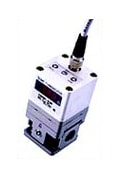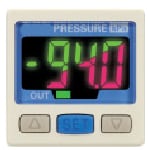Instrumentation
Pneumatic Instrumentation
One bad reading is all it takes to blow an expensive pneumatic line. When was the last time you stopped to think about whether the air pressure readings on your instruments were exact? Accurate instrumentation is vital for anyone who works with pneumatic tools, but many companies rely on dated equipment that hasn’t been properly maintained.
If you’re like most technicians, then you can probably think of several pieces of hardware laying around the workplace that needed to be replaced a long time ago but refuses to go away.
SMC Pneumatics distributes sophisticated equipment that’s compatible with the lines and other gear we sell so you can be sure that you’re getting a correct reading every single time you glance at the controls. Browse our catalog online or take a closer look at the advanced devices we offer to make your job site a safer and more comfortable place to work.
Electronic Regulator
Standard electronic pneumatic regulators offer stepless control of air pressure that’s completely proportional to an electric signal. Since these units feature a brightened LED display, they’re easy and comfortable to read. Perhaps most notably, they don’t consume very much air from your circuit.
Total air consumption is nearly 0 L/min ANR at the desired set pressure, so you won’t have to worry about a massive drop as the result of using one of these pneumatic regulators to control a line. Whenever the input signal switches on, the air supply solenoid rotates to the engaged position. The exhaust solenoid valve switches off. This causes a pressure increase in the pilot chamber, which controls the overall airflow in your circuit.
Controlling a pneumatic system was never this easy.
Each unit comes with a tapped exhaust port, a standard gauge port, IP65 compliant protections, and four different input current and voltage range options. These options make our gear suitable for most use cases. Keep in mind that we also offer a number of other special-purpose regulators that feature a distinct configuration to benefit those who have exotic installations.
Don’t forget about getting the right kind of check valves either.
Check valves are a vital part of pneumatic control circuits that shouldn’t be neglected. In many cases, you’ll hear them referred to as non-return valves since they only ever permit media to flow in a single direction.
Electricians often use diodes to turn an electrical circuit into a one-way street, so to speak. When current reaches the diode, it doesn’t ever flow backward across it in any measurable quantity. Our check valves perform the same type of function for pneumatic circuits. When air or any other similar media reaches the check valve, it can’t flow back across it in the other direction.
While these aren’t directly related to instrumentation, it’s generally a good idea to inspect all of the parts attached to your pneumatic lines whenever you’re changing out other components.
Sensors
Manipulating a compressed air system is one thing, but you need sensors to tell you exactly what needs to be done to keep the circuit moving smoothly. SMC Pneumatics once more has your job site covered with a wide array of tools that can make compressed air-related chores much less of a headache.
Pressure switches are used to detect the pressure of a specific gas or liquid in a system. They feature onboard electrical circuitry that allows users to adjust set points and outputs. Each of these outputs is configured as either a simple on-off state switch or a read switch output. Select models feature specialized analog outputs.
Pressure values are detected using either metal diaphragms, pistons or solid-state electronics. Pressure switches can be used for all of the following applications and in many other areas:
• Positioning
• Testing for Leakage
• Supply Verification
• Pressure Verification
While sensors do have to undergo regular maintenance, each of our units is tested to ensure that they provide accurate readings within reasonable tolerances. These tolerances are slight enough that any deviation you might notice is far below what would be considered a significant figure for most kinds of work that require pneumatic equipment.
This is especially good news for those who are involved in exacting chores that require specialized equipment. If your business has to monitor extremely small quantities of air or requires instrumentation that can deal with particularly powerful streams, then our engineers can get right to work designing a custom solution that meets your needs.
An overwhelming majority of firms should find that our standard options are more than sufficient, however. We offer all of the follow sensor packages to make your life much easier:
• GP46 Analog Gauges & Pressure Sensors
• ISE30 Digital Pressure or Vacuum Sensors Featuring a Dual-Color Display
• ISE40 Dual-Output Digital Pressure or Vacuum Sensors
• PS1000 Mini Pressure or Vacuum Sensor
• PSE530 & PSE543 Remote Transducers
• PSE Digital Pressure Sensor
Ordering Custom Instrumentation
Each of these parts may be applied in a variety of different ways to solve the kind of problems your business might be having. Perhaps more importantly, SMC


